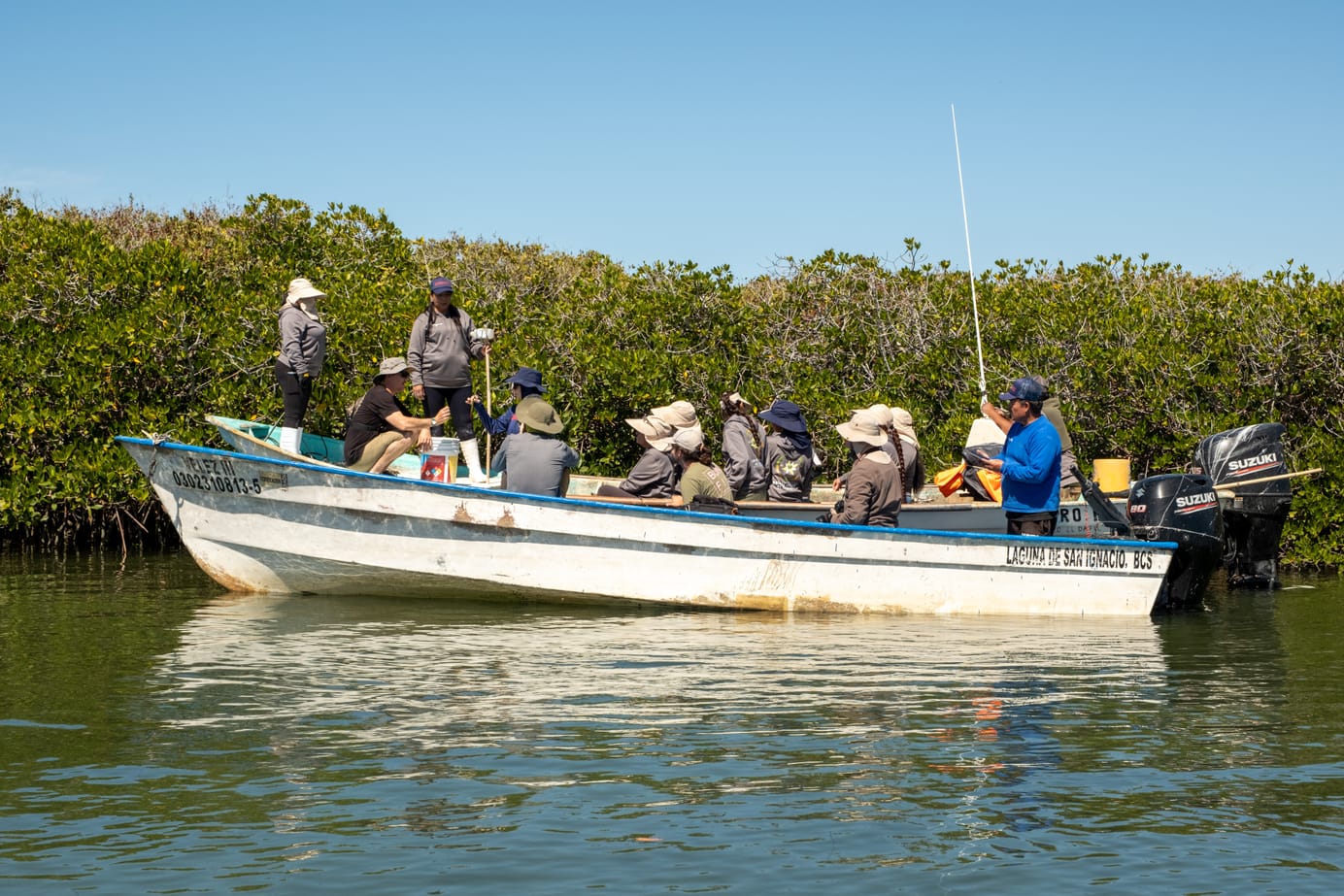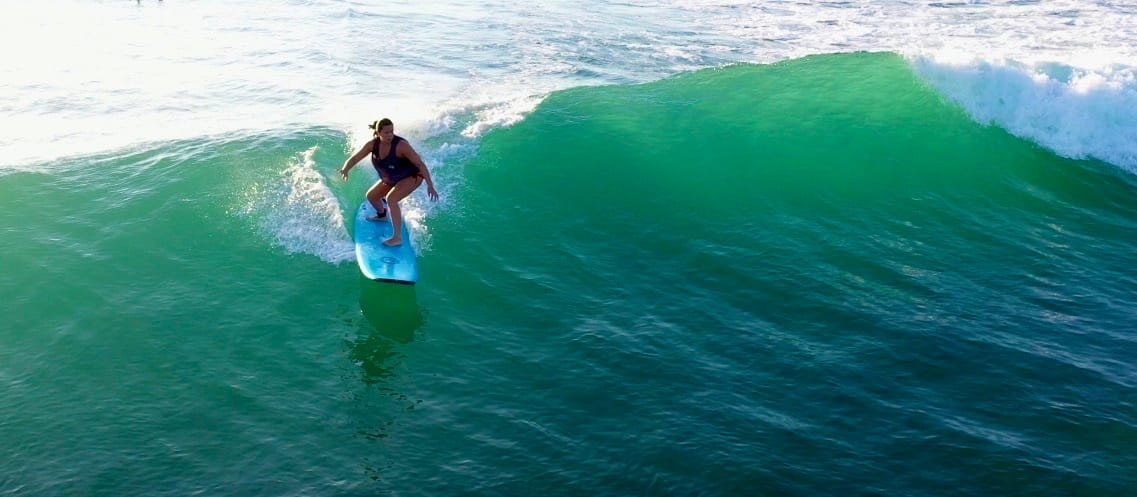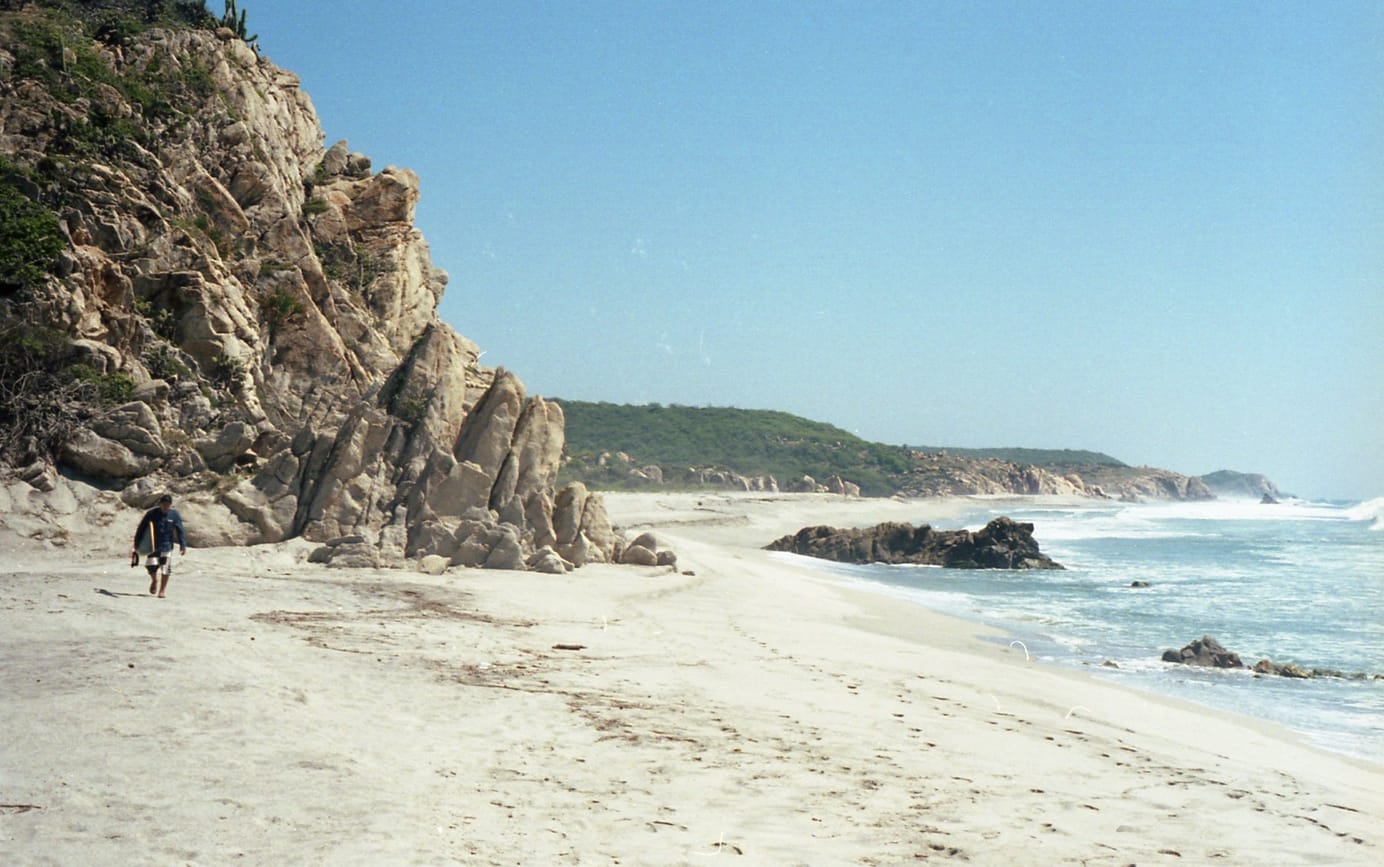
How Did We Find Pablo?
Years before Thermal was born, I made a friendship in Mexico that would go on to change the course of our lives. At the time I was the photographer and creative director for a small-batch mezcal brand, Maguey Melate, and traveled all around the state of Oaxaca to visit farms and meet the mezcaleros. When on these trips, I would plan an extra couple of days to explore the coast and surf. I had taken a few great trips to Puerto Escondido but eventually wanted to branch out and head further south so I started doing some research...
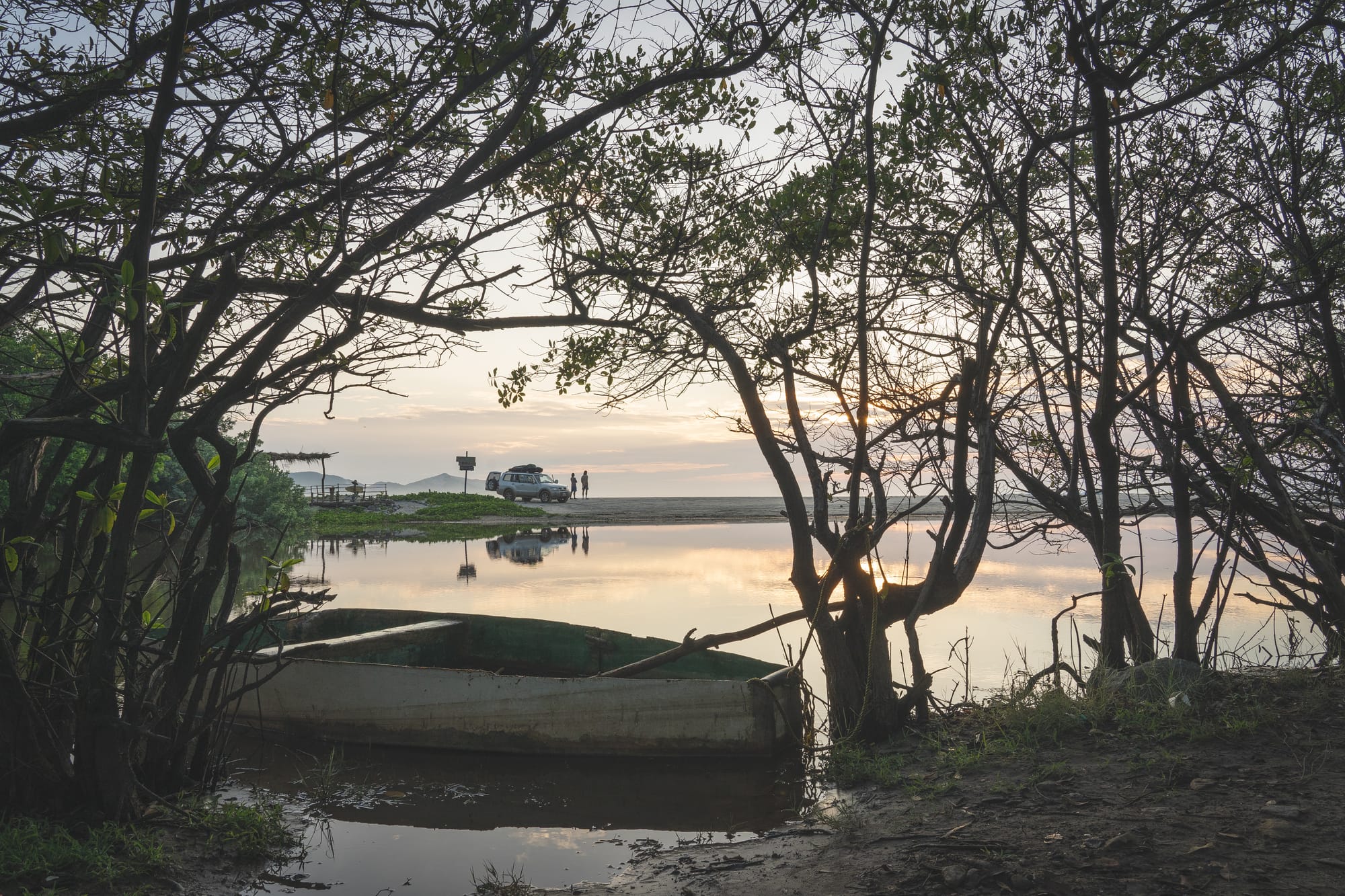
Life is Amazing
I awoke dripping with sweat in my small hotel room. I was on top of the sheets and under the ceiling fan, but still sweating. I glanced at my phone, it was 3:30 A.M. and I knew there was no chance of getting back to sleep before our surf mission. I tossed and turned restlessly as my thoughts drifted to dark places…I was in no immediate danger, but all-too-familiar demons came to haunt me and the next few hours were spent in a hellish state of near-catatonic despair. My mind played out different scenarios for the future and my stomach churned as all outcomes felt bleak, dark, and dire. Depression consumed me as the dark depths of my mind were convinced that climate change was on course to disrupt every facet of our lives. Surfing would fade into a distant memory as the world would be pushed to, and beyond, the brink of war. Humanity would suffer endless extremes of fires and floods, famine and plagues, then rebellion and massacres as private armies rained hellfire down on those less fortunate…
I don’t know why I was tripping out so hard that particular morning—the fear was an abstraction, built up over a lifetime of ominous news, compounded by current global events. Ever since I was a kid I’ve tended to contemplate the greater threats to humanity—-this itself is a luxury because one simply can’t worry about problems larger than themselves unless they have very few problems.
The psychologist Abraham Maslow spoke to this in his theory, the hierarchy of needs. This theory states, in essence, that a human cannot reach self-actualization, and everything that comes with it, until their basic needs are met. He therefore created a hierarchy of needs, often represented in a pyramid, with the most basic (food, water, breathing) at the bottom and the most advanced (morality, creativity, lack of prejudice) at the top.
According to his theory, one cannot begin to worry about larger problem-solving until one is comfortable or fulfilled. That is a luxury. Every day, billions of people worry about their physical security, health, employment, and ability to provide for their loved ones… And here I was lying awake at night stressing out about geopolitics, deforestation, climate change, and plastic pollution.

After a few hours of mental torture, it was finally time to gear up and head out. I set aside the fear and loathing and focused on thoughts of empty waves and adventure. I met Pablo on the street in front of his house and we drove the first 30 minutes in darkness and near-silence aside from the Chico Mann songs on my playlist. It was nearly dawn when I felt like I had put most of my bullshit behind me and was only thinking about the task at hand, driving.
Then as the sun shone brighter over the horizon, not yet in the sky, but high enough to kiss the tops of the trees, Pablo screamed out, “YEEEWWWWWW!”
I looked all around and couldn’t exactly tell what caused his sudden excitement, he had been very silent until then.
Then, with gusto, he yelled, “Life is amazing!”
I figured he must have just been stoked to be home after a long trip to the States, so I said, “Yeah it must be good to be home, no?”
“No hermano, it’s not even that…it’s just that life is amazing! We are alive. The two of us. Right now, and that is amazing! Life… Is… Amazing!”
He was right. Everything I had been worried about faded in an instant. I knew it wasn’t gone forever, but it was gone and it felt good. Looking back at it now, I realize it may have been the most impactful thing I have ever heard anyone say. In that moment, Pablo brought life into a clear focus like no one else ever had.
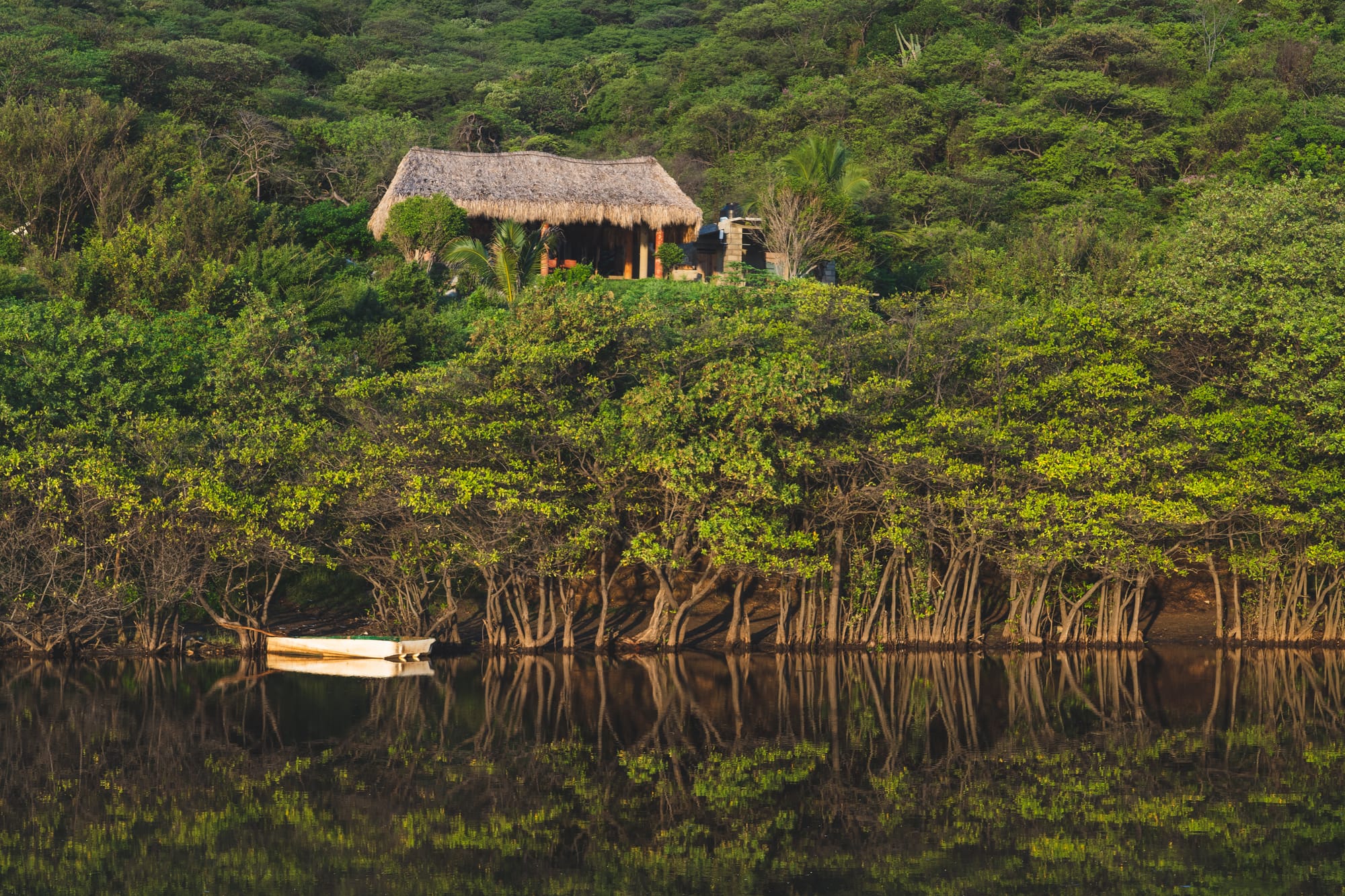
Finding Pablo
I picked Pablo up from the airport in Huatulco less than 24 hours earlier. My research led me to two stories, one in The Surfer's Journal, and another in SURFER, about the fabled wave at Barra de La Cruz. Pablo was a central figure in each as he was the first local to learn how to surf the perfect wave out front of his puebla, Barra de La Cruz. I was drawn to him as he was a respected conservationist who had worked extensively with WILDCOAST.
I was inspired by his story, a humble surfer and conservationist born in a town without running water or electricity, who used to walk hours to work; and if too tired to return, he would bury himself in the sand to stay warm, and sleep on the beach. Before surfing took over his hometown, he worked many different jobs, from tour guide to construction worker to taxi driver.
One day he picked up some Australian surfers who had been surfing La Bocana, a beach break near Huatulco, and they were frothing. Pablo asked if they liked the waves and told them he could take them to another beach, one close to his home. The surfers agreed and, lo and behold, they were the first foreigners to lay their eyes on the wave at Barra de la Cruz. Safe to say they were now really frothing.
They became friends and taught Pablo how to surf and when they left, they invited him to meet them in Lake Tahoe to work during the winter. Months later, Pablo hitchhiked to America, found his friends in the mountains, and worked construction together. When it was too snowy to work, they would stay home watching television. Growing up in a town without electricity, Pablo had not seen much TV. His favorites were the nature and wildlife shows on the Discovery Channel.
“When I saw that the birds and animals we had at home were being put on TV, I recognized they must be important… And I saw the problem with out education because, as kids in Mexico, we learn about lions, elephants, and giraffes, and so we see them as special. But we never really learn about the sea turtles, jaguars, whales, and birds that make our home so unique.” - Pablo

Eventually, the conversation moved to surf and he told me that, for many years, no one ever considered the waves in Barra as anything other than a nuisance to fishing. When the waves got big the locals would say that the ocean was "feo" (ugly) because they couldn't launch their boats. Once the wave became popular, developers tried to move in to build a hotel and restrict access. Pablo rallied the locals in opposition because, as he sees it, “…the ocean is medicine. And a small group of people should never be able to control access.”
Pablo had just returned from a few months with family in New Jersey and the first order of business was lunch with his family in Huatulco. I was given a seat at the table as if I had known them for years and I listened to them catch up on Pablo’s travels.
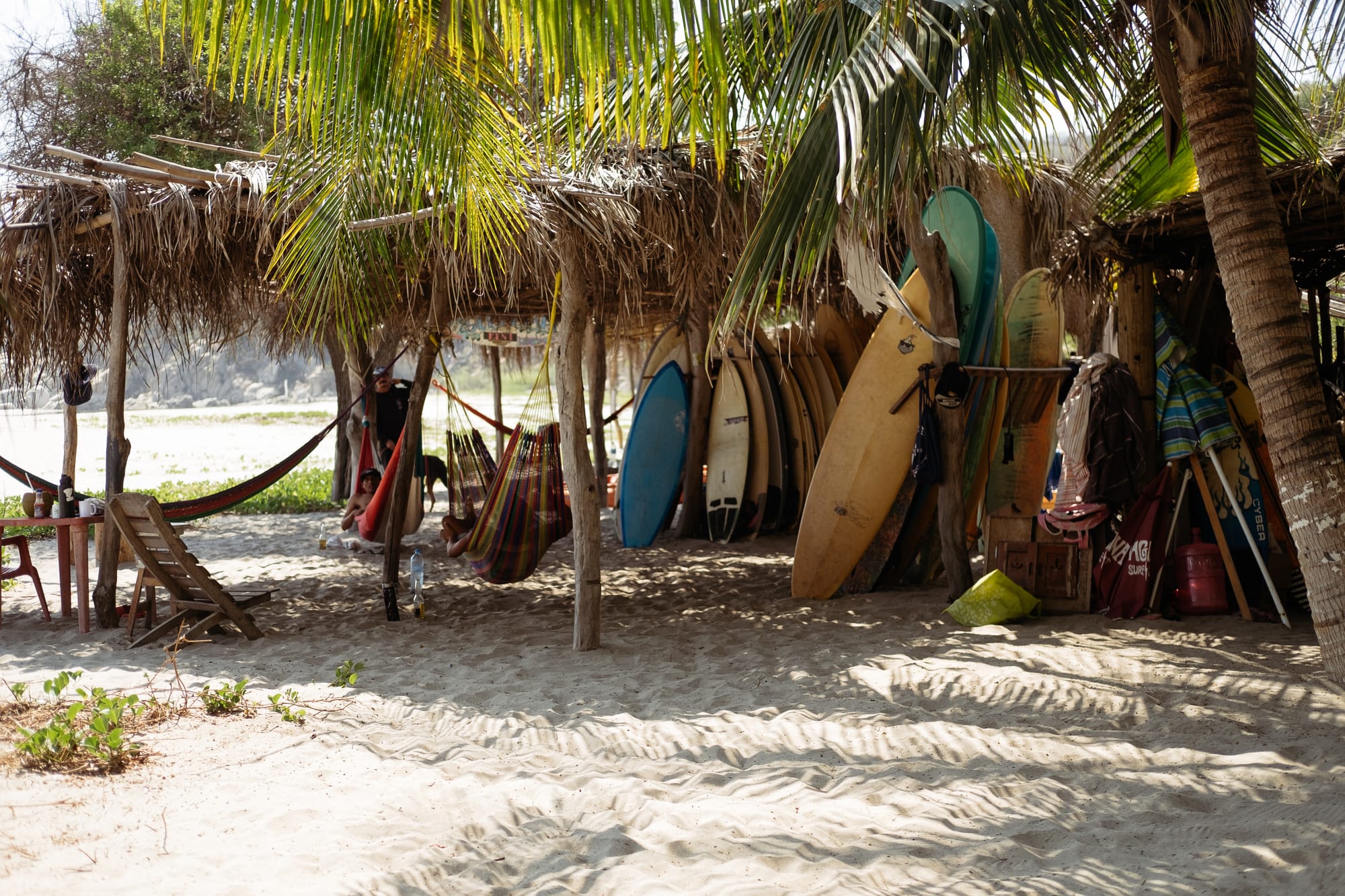
Amigos
After checking into my modest hotel and taking time to decompress, we met up again and set out to see the boys. Once again, I was welcomed as if I was an ol’ friend. Their hospitality, plus all the joints in the ashtray and beers in the fridge, made me feel right at home. Mezcal and geopolitical chat ensued and the discussion was lively. Then one moment, after I poured a particularly generous amount of mezcal into my cup one of his friends said, “Cabron…you’re a true Oaxacueno!”
“Estoy intentando (I am trying),” I said with a smile and raised my glass.
“How long are you staying down here?”
“Well, I’ve been here for 3 weeks, and it’s been great, but I leave in 3 days.”
“No! You are leaving before Dia de los Muertos?!”
“Unfortunately…” I replied with a shrug.
“NO MAMES!” he yelled.
“What does that mean?”, I asked.
“Don’t be a sucker man!”
We all laughed and I felt like I was cemented into the group’s fabric. We had moved past pleasantries and formalities and got right into giving each other shit. I was now one of the boys.
After a few hours of hanging we set off in pursuit of tacos. I had a lovely buzz as we wandered the streets and plazas of Huatulco after dark. Something so simple to my friends was a grand adventure of sorts to me. Yes, I was drunk…but only slightly. The night air tasted like magic… or maybe it’s that magic tastes like carne asada and al pastor. Between the 6 of us, we must’ve crushed some 30 tacos and 20 beers for the price of 3 cocktails in Santa Monica. A lá Buena Vida…
Beyond the Gate
The sun had been up for nearly an hour when we finally turned off the highway. We bounced along a bumpy single-track road before we reached the locked gate. Pablo called and a fellow came up on horseback to let us in. We gave him a little cash and continued down the road. We passed a group of 10 peacocks and I had a ‘Is this real life?’ moment.
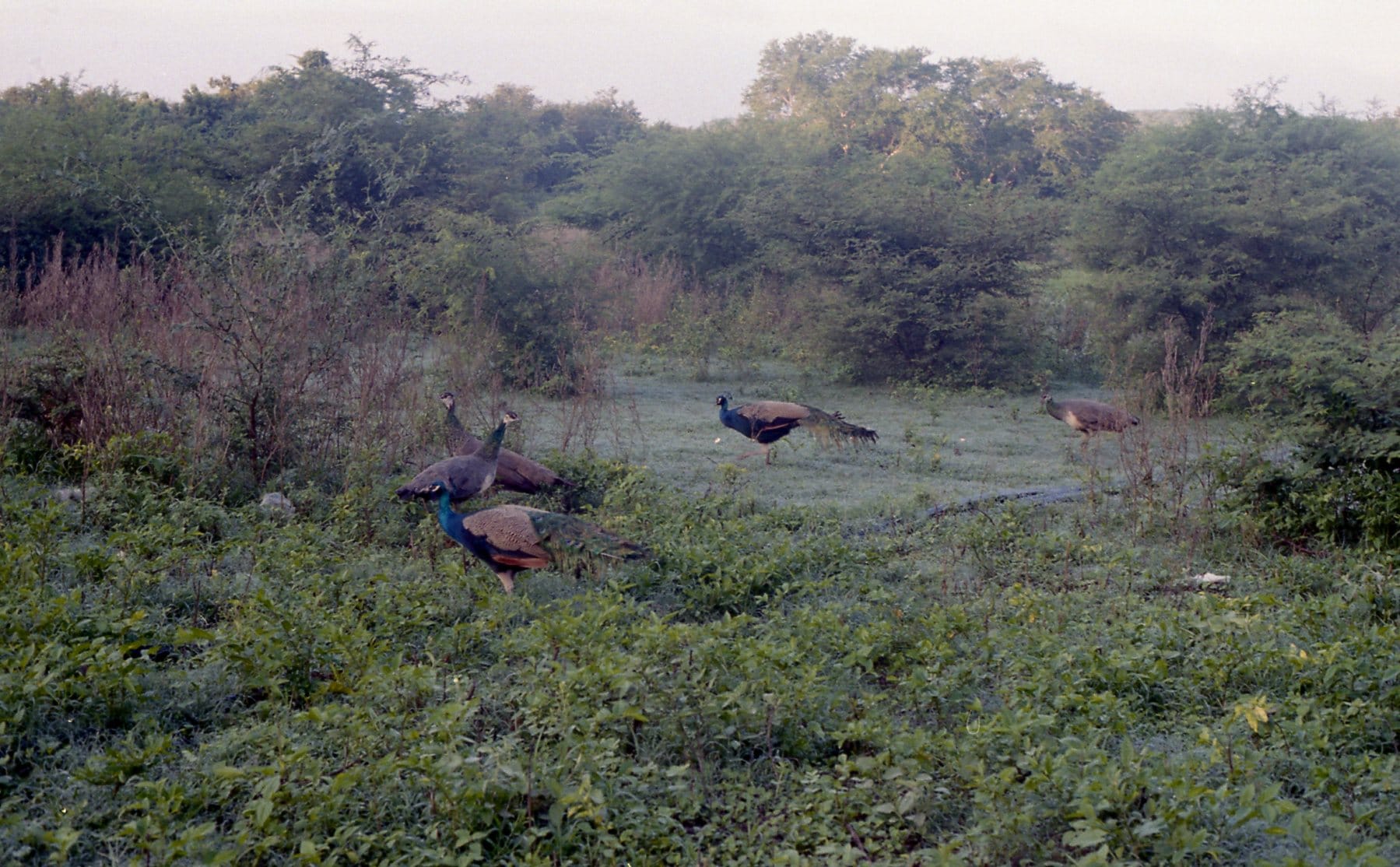
That feeling happened again when we reached the end of the road. We parked at the bottom of a small sand dune and ran up to check the surf. What I saw made my jaw drop. Hollow right-handers breaking like clockwork off the rock and then shacking up along the sandbar before detonating and closing out on the inside. A late-season south swell provided lines on lines stacked to the horizon and there wasn’t another soul in sight.
Pablo wanted to birdwatch and walk the land so I paddled out by myself and into the surreal. Giant fish kept leaping out of the water all around me and I had a hard time getting into rhythm. I kept paddling back and forth trying to find the right spot. I would halfway paddle into waves only to look over my shoulder thinking the next one was better and scramble for that one instead. I finally took a moment for myself to calm down. I had to become OK with letting them roll by uncontested and wait for the better ones.
Once I settled into the groove I must have caught 20+ waves in that first hour. It was like I was on a surf treadmill, or a wave pool without anyone else and next to zero downtime in between waves. As a goofy foot, I was dropping in backside and would grab my rail and pig dog the beginning section looking for a little shade, then a few pumps down the line to give myself time for one final maneuver before it would shut down. Even with the sandy bottom I was playing it safe because the inside was powerful and super shallow. Then, on one of the bigger ones, I mistimed my approach to the lip and awkwardly ejected from the board. I made it out unscathed but the leash broke free while I was underwater. The crazy thing is that the leash didn’t snap--the leash plug was ripped straight out of the board. Luckily I was out there alone so I just grabbed my board and kept surfing. Pablo joined me for an hour until we were both scorched and famished.
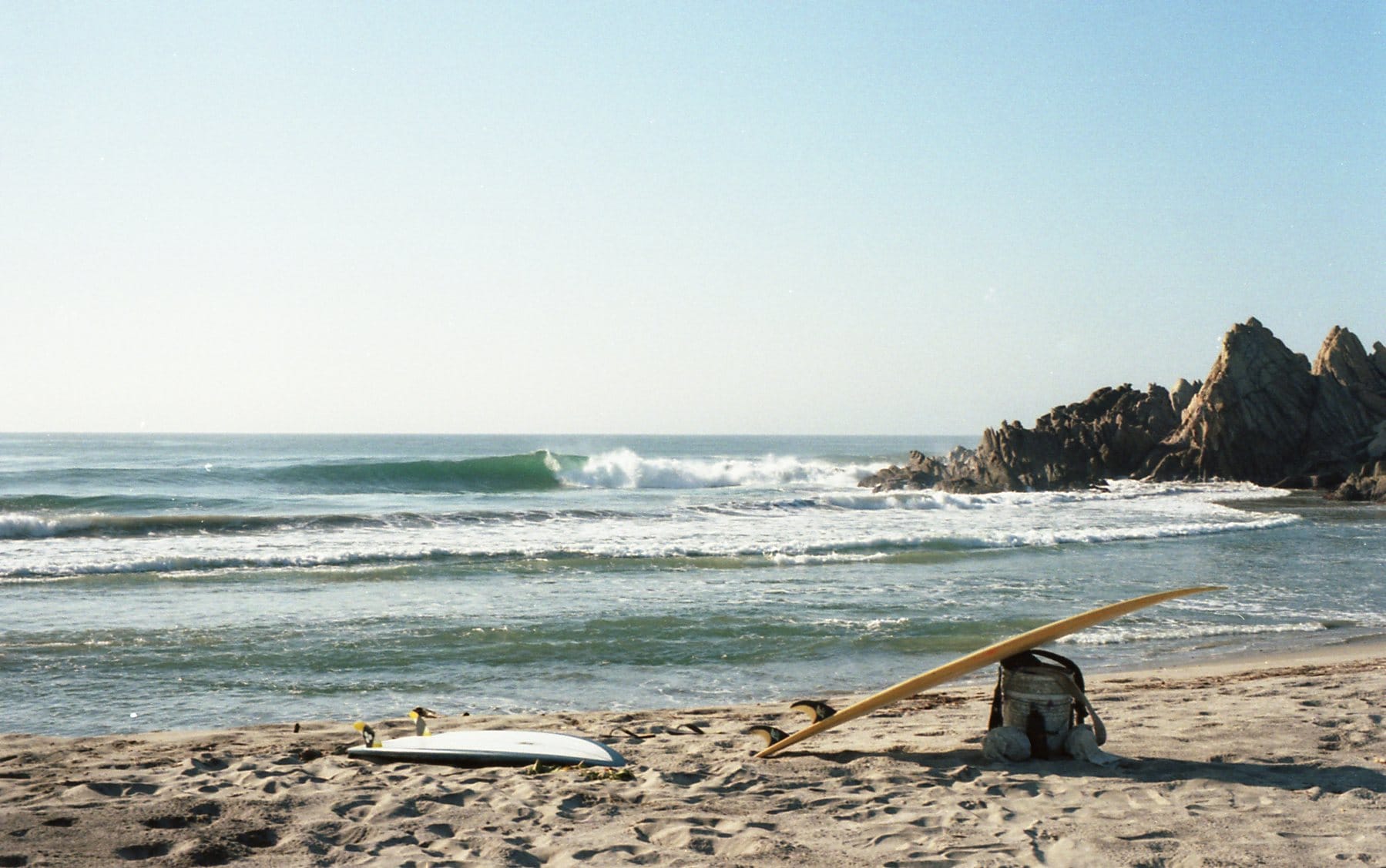
Hey Lil' Dude
After our surf, we stopped for tacos and cervezas at his friend’s restaurant on the side of the road and then Pablo took the wheel while I slept. It must have been 100 degrees and I was grateful for the rest. Our destination was a sea turtle conservation site where Pablo was close friends with the rangers (he seemed to be close friends with everyone).
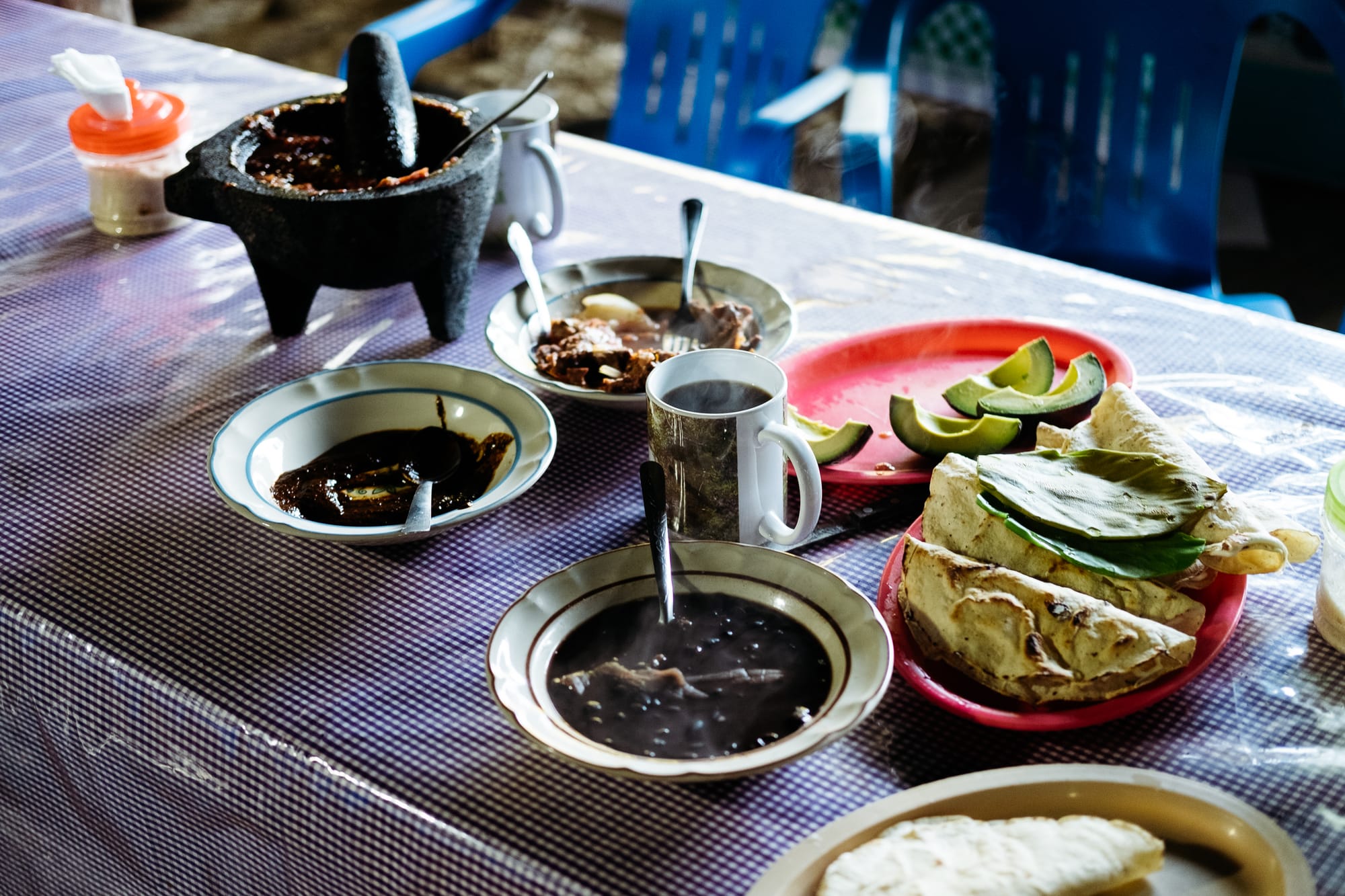
(Excerpt from my notes) All along the coasts of Mexico, different species of sea turtles come to nest and lay their eggs—and we were there, on that feral dog-infested stretch of paradise, so I could learn more about them. In a single season adult females may lay between two to seven clutches, each containing anywhere from 50-200 eggs. There are two species of sea turtles, the Olive Ridley and the Kemp Ridley, that have evolved a nesting technique called an “arribada” (arrival) that increases their likelihood of survival. When the scientific community first saw footage of an arribada, their collective minds were blown. Rightly so as it involved tens of thousands of turtles coming to shore during which over 2 million eggs were laid.
In response to such a magnificent phenomenon, the Mexican Marines assist in securing certain beaches to protect the arriving females. The country plays a key role in the survival of the world’s sea turtle population, with 7 of 8 total species nesting their eggs along the long coastline. But even with protection from Marines, volunteer organizations, and conservationists like Pablo, there are still many threats.
Once we arrived at the ranger station I began talking with a woman volunteering there from Santa Barbara. She had been there for a month and was excited to see the upcoming arribada, a mere two weeks away before she returned to California. I had kept hearing about how dogs were a huge problem at that beach but I still didn’t understand.
I mentioned it to my new friend and she said, “…oh you will. They’re a huge problem around here.”
“Ok, I’ve got a lot to learn.”
“The main things threatening the turtles are dogs, poachers, and plastic pollution. Look, I filmed this video a few weeks ago…”
She pulled out her phone and showed me a heart-wrenching video of hatchlings trapped in discarded fishing nets.
“Oh my God, that’s so terrible…”
“Luckily, I got them out but it took a few minutes to free each one. They wouldn’t have made it otherwise. They say we shouldn’t interfere but the plastic shouldn’t even be there.”
After our brief chat, it was time to hop on the ATV with Pablo and Chaco and see for myself.
When we first set out along the beach it looked deserted. A closer examination revealed a much more sinister truth: turtle carcasses, lots of them, and plastic pollution, of all sizes, littered the beach. Whether the turtles died of natural causes is impossible for me to say. As for the plastic, there were many large pieces and most of it looked like it had washed up with big swells after spending lots of time at sea– it wasn’t just from nearby runoff.
As we cruised south on the ATV I spotted packs of dogs lingering and lounging on the dunes at the edge of the forest. They had been resting in the shade waiting for dusk, when they would commence their nightly sea turtle massacre. The engine noise drew them out to investigate what was happening on their beach.
Most kept their distance but an especially wild one gave chase and, before long, the bastard was gaining on us. At full sprint, he was rapidly closing in on our lead. Pablo and I were riding on the back of the ATV with Chaco at the wheel. Until that moment I had felt safe; sure the roaming packs of feral dogs weren’t a comfort, but they kept their distance and we had the ATV.
But this particular one was crazy and fast, like Usain Bolt…only a zombie. He was coming up on my side and I had a clear view of the beast—-he looked like a messed up hybrid of a hyena and a small wolf. His white teeth flared as he barked like mad and chased us down. I was sure Chaco didn’t know, he was looking straight ahead and, even at half-speed, the engine was drowning out the barking. I wanted to tell him to speed up but, in Mexico, machismo gains respect and I didn’t want to be just another gringo. I couldn’t see any foam in his mouth but the deranged dog seemed rabid and he was now barely a meter away. I reached for one of my sandals and prepared to block a potential attack. Isaac felt the movement, looked over his shoulder, and said, “Que perro loco!”, and gassed the throttle and left the crazy dog far behind…

Under natural circumstances only 1 out of 100 turtles reach the sea and only 1 out of 1000 reach adulthood. Birds play into this statistic as they swirl overhead watching for the hatchlings to make the deadly dash to sea. The defenseless turtles are no match for them and get ripped to shreds by the beaks and talons. It is cruel. It is savage. It is hard to watch, but, it is natural.
The dogs at this particular beach originally came with fishermen and were left or strayed off and were able to breed, feed, and thrive (I have heard that at other beaches, in different regions, pigs can be a similar threat). Unlike the scrawny city strays, these dogs were fed and at the top of the local food chain.
We spent two hours roaming the beach until the sun sank low on the horizon. We would scan the sand and watch for hatchlings emerging from their nests. The dogs were the giveaway, they would start digging up the sand after seeing a hatchling emerge and then birds would circle overhead. We would bolt over in that direction and scare them away to provide safe passage for the turtles. They left me at one of the nests and went off to check on others. I did my best to try and provide security without interfering: so I stood there waving my arms and hat in the air to scare the birds and then occasionally charge at the nearest dogs while growling as best I could. I must have looked deranged.
I quickly realized it was a losing battle, there were far too many birds and dogs. Pablo and Isaac were then waving to me and calling for help and I made a conscious decision to break the rules and interfere with the natural process. I picked up the hatchlings and used my hat as a basket to safely hold them while I ran over to the other nest.
This nest was teeming with hatchlings trying to make it to the sea and so more went into my hat until I took them down to the water's edge. Some would say that my actions were a breach of protocol as humans are not supposed to get involved and touch or help wildlife, even if they are fighting for their lives. I can respect that but I also respectfully disagree: Those dogs should have never been there in the first place and it was going to be a blood bath.
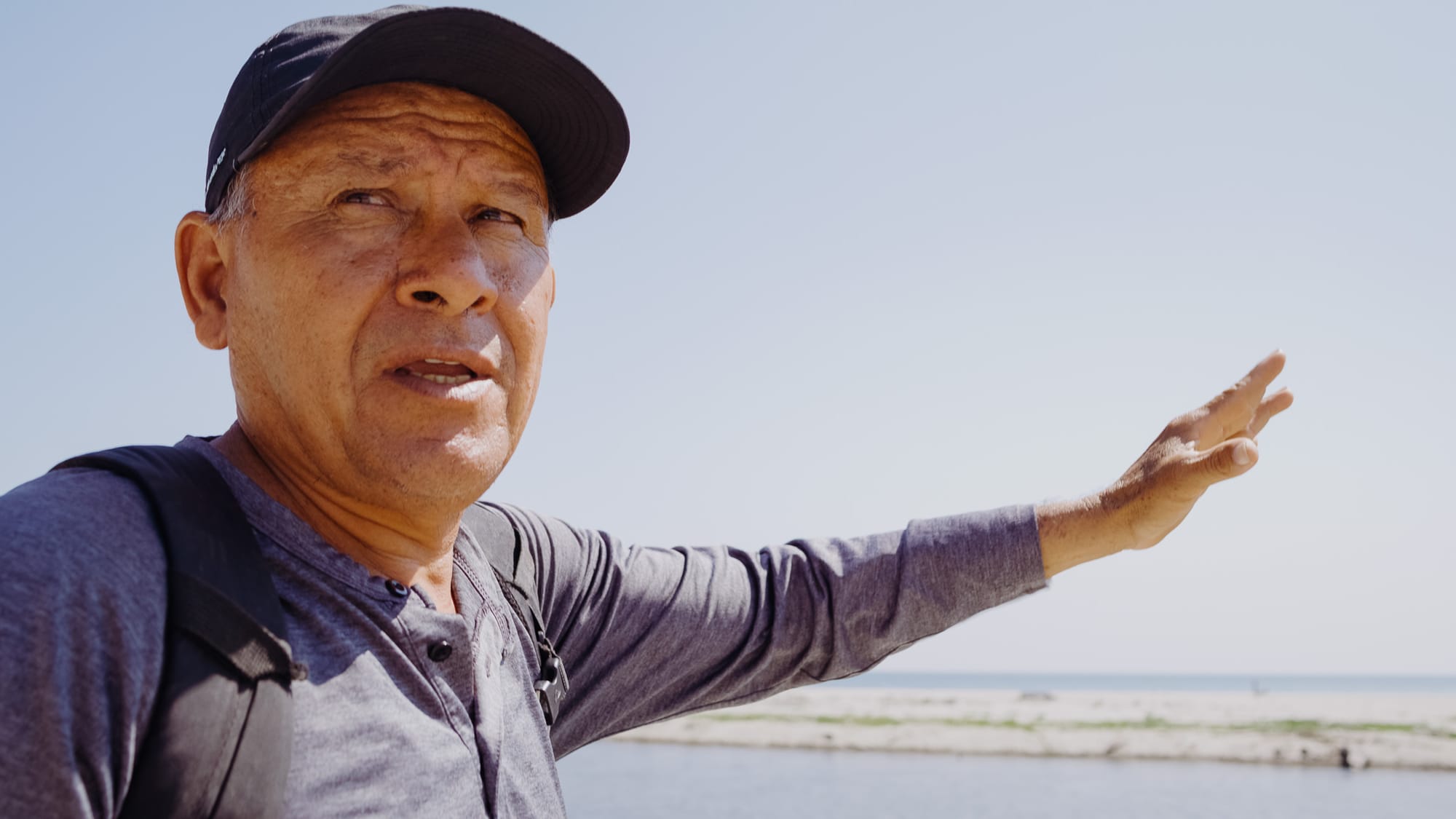
The Human Element
For most of us, poaching sea turtle eggs is absurd. Why would anyone endanger such an adorable and utterly harmless creature? Well, it’s a complex case but at the root of it all is money and a myth. The myth is that turtle eggs increase male sexual performance. Now, who knows where this myth came from, but it is hard to dispel because, again, machismo is the name of the game in Mexico and anything a man can do to increase his male-ness (and sexual performance) is a must.
While there is nothing to back up such a crazy claim, there are still markets and vendors who work with the poachers to cater to the wannabe machos. Thankfully, there are good and wise men who fight such nonsense like Pablo and, most notably, renowned Mexican poet and environmentalist, Homero Aridjis, who spearheaded the 1990 campaign to ban the sale and possession of turtle eggs in Mexico. Throughout his 80 years, he has led efforts to reduce air pollution, prevent chemical contamination of waterways, and protect creatures like whales, monarch butterflies, and sea turtles.
“If you want to improve your sex performance, go take Viagra. Don’t kill one of the oldest animals on the planet.” - Homero Aridjis
Even though the trade is illegal, and there are plenty of legal and easily available sexual enhancers, there is a demand for sea turtle eggs. In coastal Mexico, it is almost a traditional belief, like the Chinese believe rhino horns treat fevers and headaches. I wish there were no such beliefs. Yet there are… and the trade is fueled by money.
While rhino horns are incredibly lucrative, fetching up to $60,000 per KG, turtle eggs are not. The poachers are often adolescent men, some as young as 11 or 12, and may receive as little as $5 for a garbage bag full of eggs. They are then sold in markets and restaurants for $1-$3. This is crazy. For those who can appreciate their beauty, sea turtles are priceless; to see one swimming free is a powerful experience.
Before I understood the dynamic, I thought that anyone who would do such a thing had to be the scum of the earth. A subset of humans so inherently evil that they may as well be Voldemort Nazi Scum. That was until I came face to face with one, and he reminded me a lot of myself…
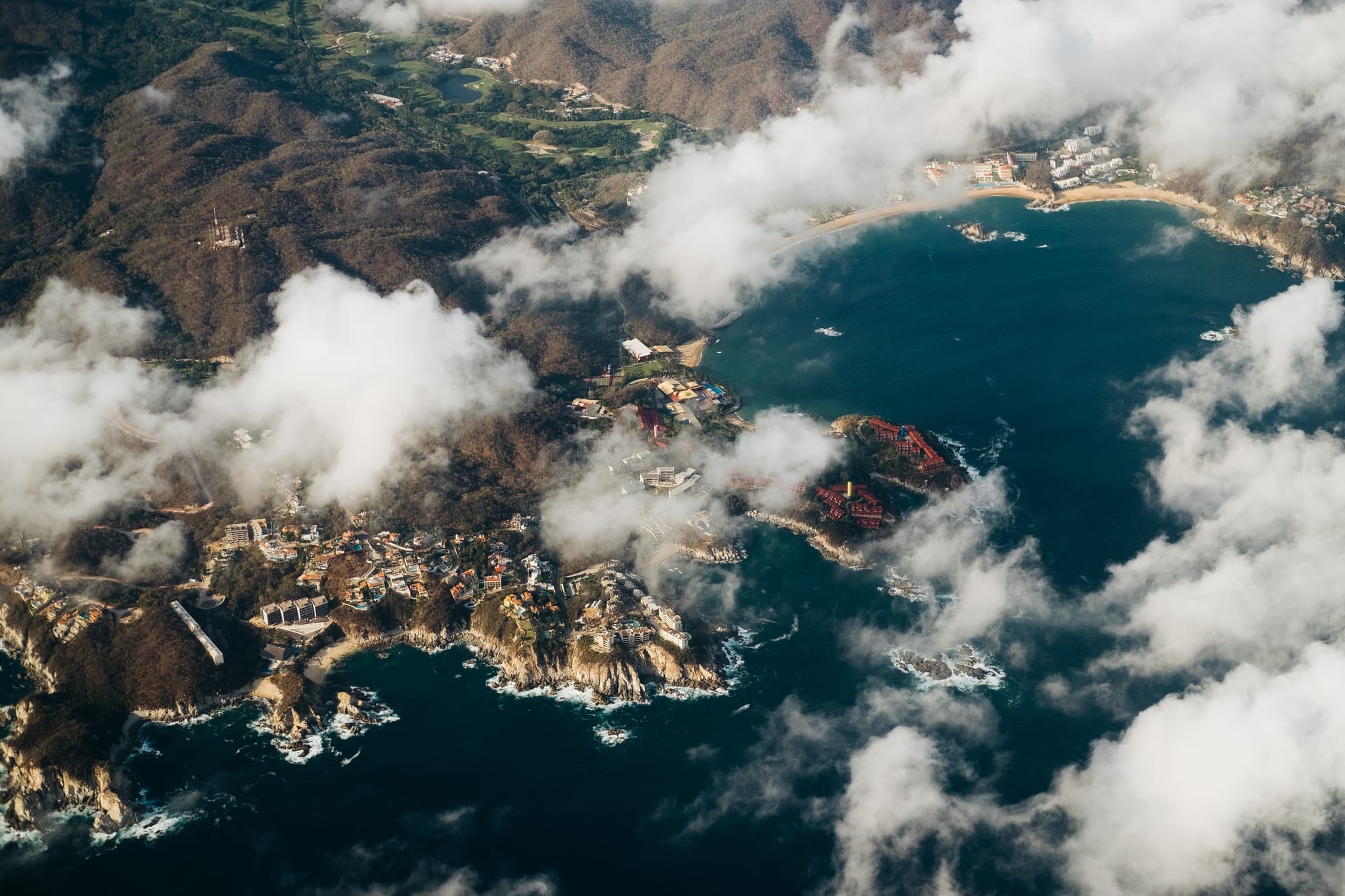
CONSUME
Now, I have never poached anything but I used to really want a dirt bike and only cared about hanging with my friends. That’s exactly where this kid was. He was 15 years old and lived on the side of the highway with his parents. Pablo was friends with his folks and so we stopped there for dinner. They ran a restaurant out of their modest home and Pablo had brought the boy a baseball glove as a gift from America. When he asked how he was doing in school, his parents said they were concerned because all he wanted to do was drop out and poach turtle eggs with his friends so he could one day buy a dirt bike. Being in school meant that he could only poach on the weekends, which was already much to the dismay of his parents. They didn’t want him to poach at all.
Pablo offered to train the boy to work with him and learn how to lead nature tours and expeditions. This way he could earn a living without killing. The boy refused and offered no good reason why. He was 15, and he wanted to hang with his friends and that’s all the reason he needed.
The memory of that boy stayed with me, I was shocked that he could poach and feel no remorse, yet, I could also totally identify with his youth and the naïveté that comes with it. I thought about our different worlds and how I know people who would have paid hundreds of dollars to be able to see them swim in the wild…and then there was a boy who would collect hundreds of eggs, jeopardizing the future of the entire species, for a handful of dollars. His parents weren’t rich but they worked hard to provide and were able to feed him and send him to school, was this not enough?
Unfortunately, the allure of consumer culture is nearly ubiquitous thanks to far-reaching media and messaging that place material possessions and status above all else. I believe the boy’s desires were not his own as much as they were a byproduct of Western programming: act like this, dress like that, drink this beer, own this car. It takes a high level of media literacy and self-esteem to realize it is all an endless game and you don’t need any of those things. Even most of the youth in America are completely swept up in this vicious cycle of buy, buy, buy…and we created the cycle.
Nowadays, whether you grow up in rural Mexico, Brazil, Indonesia, or nearly anywhere, you have almost no chance to escape the all-seeing eye of advertising: billboards, commercials, product placement in tv shows and cinema, and, of course, social media. There are over 95 million new posts on Instagram every single day, although they are not all paid advertisements, many are a reflection of the consumer culture we grew up with and are therefore selling something even if the creator of the post isn’t conscious of it. If this mentality continues unchecked, sea turtles, along with countless other species, may soon be a thing of the past.
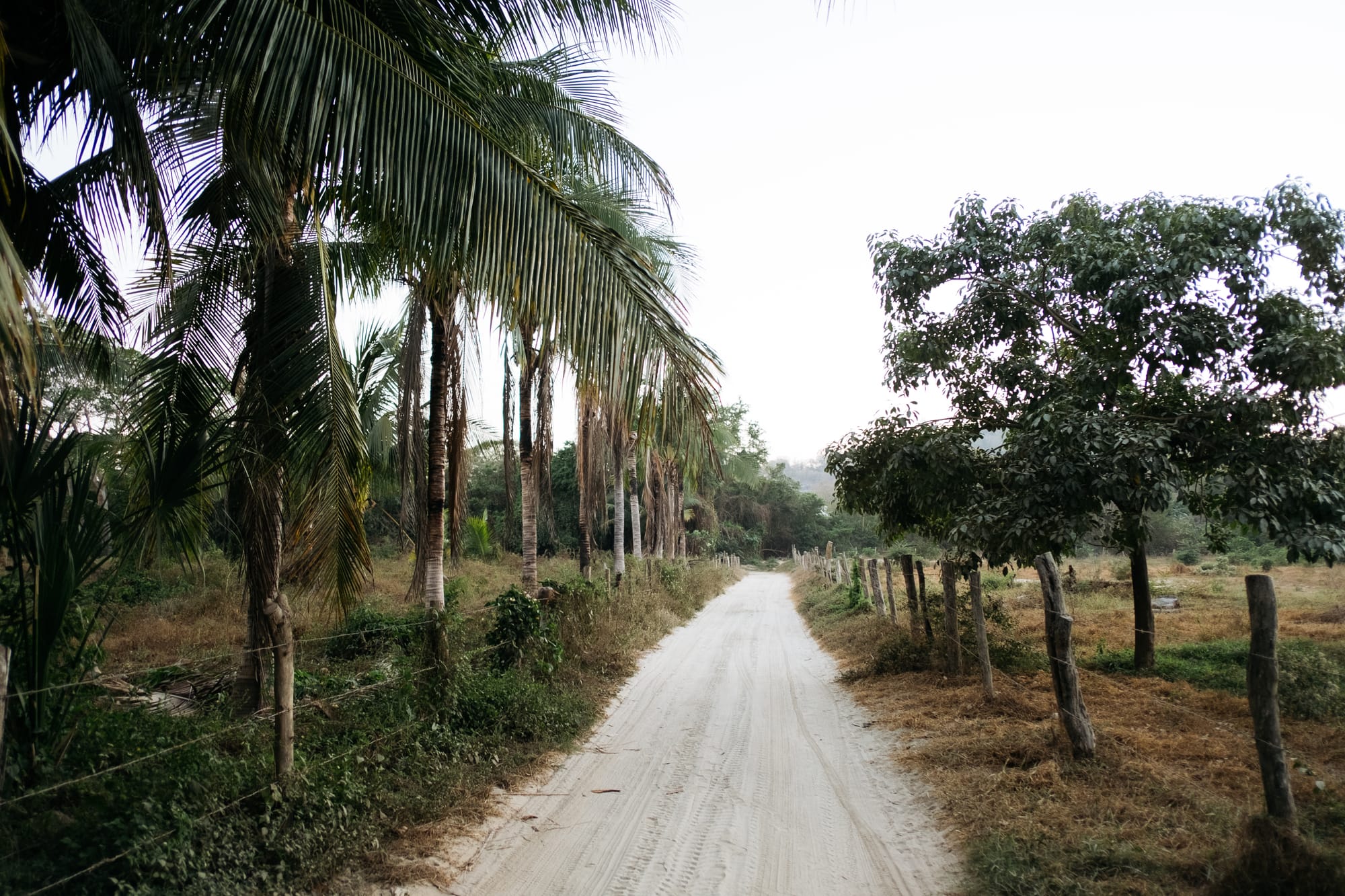
CONSIDER
You may be asking, couldn’t he get a ‘normal job’ and leave the turtles alone? Well, the state of Oaxaca is one of the poorest in Mexico, and his family lives an hour from the nearest town, so opportunities are slim. Now, Oaxaca is also home to the richest biodiversity in all of Mexico. While that does provide for an ecotourism industry, it isn’t big enough to provide for every family. All too often that means that many people resort to exploiting the environment to get by. The means a local takes to survive, like poaching turtle eggs, may be seen as absurd to an outsider, especially when out of context. However, considering the hierarchy of needs, the act is potentially mitigated. In the case of the boy, he didn’t need to poach to survive but —dirt bike— he viewed it as necessary to meet his social needs and become a valued member of his friend group.
Yes, this is merely the story of one boy in rural Oaxaca, yet I feel it is a microcosm for many others. The socio-economic realities of much of the world are unknown, overlooked, or ignored by many of us in America, but if our hierarchy of needs is being met, why do we not care more? Are we just too busy chasing things? Are there just too many problems out there? How can we inspire people, who have had their needs met, to make better use of their time? How can we check our “need” to consume, and our compulsion to post about our lives, with the urgent need to preserve our environments and restore ecological balance?
We Don't Know What We've Got...
Well, I for one, believe we can do better and I was moved to write all of this because I was inspired by a humble surfer and conservationist I met in rural Mexico. My talks with Pablo opened my eyes in many ways and during our time together I could see he was a respected member of the community. He assured me it wasn’t always that way and that people used to think he was crazy when he would advocate for the environment over massive development projects. There are certainly those who still think he is crazy, but now many trust him because they know he is one of them. He is a true Oaxacueno and his goal is to preserve the tremendous biodiversity of the area through education and ecotourism. He knows that it is possible to protect the natural world and provide economic opportunity, his message is they do not have to sacrifice one for the other.
In one of our talks, he explained that a big part of the problem is that the youth are unaware of the value of their surroundings. They don’t know that people in America, Europe, Asia, and even Africa, may fantasize about sea turtles, jaguars, and whales. They take them for granted just like most of us in America take our wildlife for granted. How many of you can name 20 different plant or animal species outside your home? Yet many of us can recognize and appreciate animals from far-flung locales like snow leopards, anacondas, and gorillas because we have seen them celebrated on TV.
My time with Pablo taught me we must fight now for what still exists because we never fully appreciate something…Until It’s Gone.

